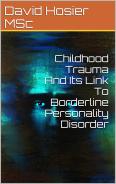Tags
Anger Resulting from Childhood Trauma. Part 2.
It is better to express anger in a healthy and helpful way rather than to REPRESS or DENY it (in the case of the latter, it can profoundly, negatively affect our peace of mind or lead us to TURN THE ANGER IN ON OURSELVES or DISPLACE it (i.e. take it out in an inappropriate way on those who do not deserve it).
AMBIVALENCE.
It is natural to feel anger towards the person/s who caused our childhood trauma but the anger we feel is often COMPLICATED BY FEELINGS OF AMBIVALENCE if the person/s who caused our trauma also did good things for us. Such ambivalence can feel very painful and confusing, leaving us feeling CONFLICTED. In simple terms, we develop mixed, and very often contradictory, feelings towards the person/s.
Alternatively, we may excuse the person/s who caused the trauma by telling ourselves they behaved as they did due, for example, to the extreme stress they themselves were under.
This may make it more difficult to feel the anger, and, as a result, we may feel EMOTIONALLY NUMB ( a kind of dissociative state).
Whilst anger should not be forced, if we find it difficult to connect to our anger the following exercise may be useful:
1) to imagine ourselves at the age we suffered the trauma, remembering how young and vulnerable we were (if you have a photograph of yourself at the relevant age to look at this could be helpful).
2) think about what occurred and how it made us feel
3) think of the ways in which our lives have been damaged as a result, and how many years have been lost (it is important to do this in a safe way and reading my post on COPING MECHANISMS could be helpful in order to help ensure this).
When we can start to feel the anger without it overwhelming us, we can try to focus on our anger for longer periods of time.
Now we turn to how to deal with these angry feelings:
HOW TO DEAL WITH FEELINGS OF ANGER.
We often respond to anger in ways that only damage us. This may include turning the anger in on ourselves (eg self-harm, self-hatred), turning it on others who do not deserve it (DISPLACEMENT) or perhaps turning to drink and/or drugs to temporarily dissipate the pain and anguish our feelings entail.
However, clearly it is important to deal with our anger in a CONSTRUCTIVE way.
One way to do this is to express it ASSERTIVELY (i.e. in a CONTROLLED, APPROPRIATE and RESPECTFUL manner).
To express anger towards a particular person, in a SAFE and appropriate way, can be achieved in the two ways outlined below:
1) INDIRECTLY:
here, the person is not confronted face-to- face. Examples would be to write a letter (it is not even necessary to send it; merely writing down our feelings towards the person with whom we are angry can be a step forward, alleviating the painful feelings associated with repressing anger) or to role play (perhaps getting a friend to play the part of the person we are angry with).
2) DIRECTLY:
In order to make sure this is done appropriately and safely, planning and preparation are definitely helpful.
If you have found this post of interest you may wish to read my article on ‘Intermittent Explosive Disorder’ which can be accessed by clicking here.
David Hosier. BSc; MSc; PGDE(FAHE).




